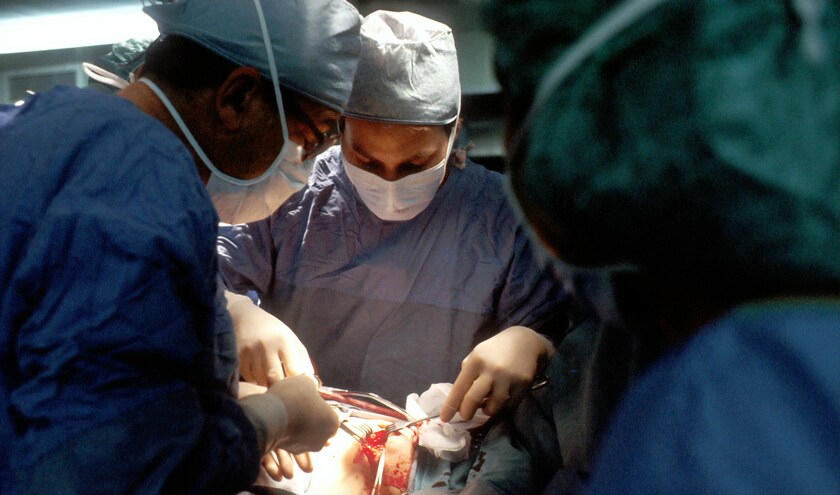NHS England figures show overall waiting lists down by around 70,000 in September to 7.57m from 7.64m.
Professor Sir Stephen Powis, NHS national medical director, said the figures showed how staff were ‘making use of the latest innovations, including surgical hubs, to bring down waiting lists and deliver 7% more treatments than the same month pre-pandemic, while also delivering more tests and checks than any other September'.
Sir Stephen warned the NHS was under ‘more pressure and busier than ever before', however, as it headed into winter.
There were 2.36m A&E attendances last month, 6% more than the previous busiest October (2.22m in Oct 2023) and coming on the back of the most pressured summer and September. It was also a record October for emergency admissions (567,446). Despite the pressure, A&E performance was up 2.7 percentage points on the same month last year (73% vs 70.3%). Over 12,000 beds were taken up each day by people who no longer needed to be there.
Ambulance teams responded to more incidents than any other October with more than three quarters of a million incidents (759,019) including a record 84,108 of the most serious Category 1 incidents for that month, up more than a third (37%) on the same period pre pandemic (61,561 in Oct 2019).
999 calls hit a yearly high (1.187m) and almost 3% more than the same time last year (1.156m in Oct 2023).
There was progress on the number of people waiting over a year for elective treatment, down 33,321 in September to below 250,000 (249,343), down 140,000 since September 2023 and a 50,000 reduction since the end of June 2024.
In September, the NHS missed its target to virtually eliminate waits of 65 weeks by September, with 22,903 patients still waiting that long. Sixty-five week waits are down more than 90% on their peak (233,051 in June 2021), however, with just 12 providers accounting for over two-fifths of the remaining waits.
It was a record September for diagnostic activity with 2.37m tests and checks delivered, up a fifth on the same month pre-pandemic (1.95m in Sep 2019).
Every month so far this year has seen more than a quarter of a million people checked for cancer following an urgent referral, including 256,996 in September, with staff carrying out 53,861 cancer treatments.
Response
Health and social care secretary Wes Streeting said: ‘It is welcome to finally see progress start to be made on the backlog. Since we ended the strikes, we have been ramping up delivery of an extra 40,000 extra appointments every week.
‘The extra investment in the Budget for new surgical hubs and scanners, plus the reforms announced this week to drive up productivity, will cut waiting lists further and get patients seen faster.'
Siva Anandaciva, chief analyst at The King's Fund, said: ‘The figures show that NHS performance issues are endemic across the country and deep-rooted, with many key targets having been missed for years.'
Anandaciva warned Wes Streeting's announcement of league tables yesterday ‘alone will not lead to better and faster care this winter and could result in the unintended consequence of health leaders becoming too focused on reporting upwards to national bodies, instead of outwards to what their local communities need'.
Rory Deighton, acute director at the NHS Confederation, said: ‘The fall in waiting lists for elective care is very welcome and testament to the hard work of staff and Government should take credit for taking swift steps on industrial action.
‘While the Government used the Budget to pledge some vital funding for the health service if the NHS is going to meet the Government's ambitions and sustainably improve performance then the centre will need to invest in the right capacity and capability to support leaders and their teams to improve.'
Tim Gardner, assistant director of policy at the Health Foundation, said the measures announced by the secretary of state ‘must be supported by other policies to improve performance'.
‘Improvement will only happen if staff believe these new processes to be fair, that support is genuine, and that their voice is heard – or we risk further lowering of morale,' Gardner added.
Nuffield Trust deputy director of research, Sarah Scobie, said: ‘Yesterday the secretary of state laid down the gauntlet to the NHS to ensure patients see real improvements in the quality of healthcare. But with systemic issues like crumbling buildings, profound problems in the social care sector and continued pressure on community and primary care, today's figures underline once more just how far the health service has to go to really turn things around and offer the quick access to care that patients need and deserve.'
Isabel Lawicka, director of policy and strategy, NHS Providers, said: ‘It's good to see the overall waiting list come down plus more diagnostic tests, cancer checks and treatments. But too many people are still waiting too long for care despite trust leaders and staff giving it all they've got to see patients as quickly as possible.
‘We look forward to the government's promised Elective Reform Plan to help cut waits. Extra winter demand will make it hard to maintain progress on reducing waiting times and discharge delays.'
Helen Morgan, Liberal Democrat spokesperson for health and care, said: ‘The Government has rightly committed extra funding for the NHS but they must now understand that we cannot save the NHS without tackling the crisis in social care.
‘It is therefore critical that the Government reverse their misguided tax hikes on GPs, care homes and pharmacies that will only pile more pressure onto already stretched budgets and make the crisis in our health care services worse.'



